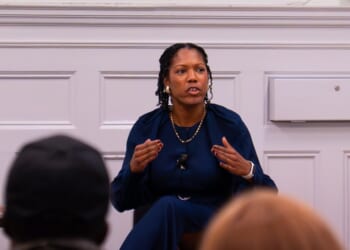
Recently, the Supreme Court heard oral arguments in Chiles v. Salazar, a case that could restore freedom of speech and conscience to the client-therapist relationship. I’m a licensed clinical psychologist with deep concern about this case, because I help people with their unwanted sexual attractions.
The media often portrays my clients as victimized individuals who have been pressured into therapy by right-wing social pressures and religious dogma. In truth, my clients are self-motivated individuals whose goal is to live in alignment with their deeply held values, including their values regarding their sexuality.
Sometimes, my clients’ unwanted sexual feelings are unwanted LGBT attractions.
Many of my clients are people of faith — typically Christians, Jews, and Muslims — who believe they are designed for heterosexual love and family. Respect for their faith means respecting their freedom to pursue their goals.
Yet for more than a decade, state governments (and several nations) have tried to silence voluntary client-therapist conversations by painting all therapeutic approaches with a broad, politically weaponized label “conversion therapy.” This term is vague, ill-defined, and creates a chilling effect for therapists like me.
These laws prevent a therapist from helping the client change his unwanted sexual attractions. On the surface, this sounds like it could protect the client. However, they create a mess of government intrusion that limits the client’s therapeutic choices. Here is a real-life example: if a client identifies as gay, but at some point during therapy, chooses to explore heterosexual attractions, I cannot help him with that goal. That would be against the law.
During the Chiles v. Salazar oral arguments, several Justices pressed the state of Colorado with sharp questions showing their concern that these therapy bans have crossed a constitutional line. But beyond violating the Constitution, such laws violate something even more basic: good therapy. No ethical counseling relationship can function if politicians, rather than clients and therapists, control what may be discussed in the privacy of the therapy room.
I brought up this problematic scenario in my Reintegrative Therapy Association amicus brief, and it was raised by Justice Samuel Alito, who appeared to agree that these therapy bans look “like blatant viewpoint discrimination.” Justice Elena Kagan (an Obama appointee) shared a similar concern.
Proponents of therapy bans cannot answer a simple question: why should the government decide which viewpoints are acceptable in a private counseling session?
At its core, Chiles v. Salazar is about freedom — the freedom for counselors to discuss the subjects their clients choose, without government interference. But beyond therapists’ right to free speech, this case highlights a deeper issue: the right of individuals to pursue therapy that aligns with their personal goals.
In a healthy counseling relationship, clients are in the driver’s seat, setting their own goals. The therapist listens, supports, and helps those clients work through the issues that cause conflict in their lives.
Yet, politicians have decided which sexuality and gender identities may be explored in therapy and which are forbidden. That is viewpoint discrimination, masquerading as compassionate protection.
Of course, when we discuss sexual attraction changes, we should not think in terms of flipping a light switch (gay-to-straight), but rather, rotating a light dimmer — we’re talking about gradual shifts of varying degrees. No two people respond the same way, and no therapist can ever guarantee an outcome. But a growing body of new evidence suggests that some emerging interventions do change sexual attractions. And the results are safe, effective and durable.
Working with gender-confused clients is another area of concern. With data showing that up to 85-90% of preteen children with gender dysphoria will eventually embrace their biological sex if left alone and not encouraged into transgenderism, we should be ensuring more access to talk-based therapy, not less. Young people should have the opportunity to process their feelings without being pushed toward irreversible medical procedures or one predetermined outcome.
The false assumption behind therapy bans is that sexual attractions are innate — that people are “born that way” in the same way they are born male or female. Yet the largest genome study ever conducted found that no single genetic marker determines a person’s sexuality. Sexuality is complex; thus, the so-called “gay gene” determinant is science fiction.
In fact, research shows that sexuality, like many aspects of human experience, is shaped by environment.
Our understanding of the brain’s neuroplasticity shows that unwanted sexual attractions can change as emotional wounds are healed. In Reintegrative Therapy, we don’t focus on changing sexuality, but on dealing with underlying attachment wounds and trauma. As clients resolve their traumatic memories, they often experience their sexual attractions spontaneously changing as a byproduct. In my own clinical experience, most clients experience some significant degree of change in their sexual attractions.
Unfortunately, the American Psychological Association and many state legislatures refuse to acknowledge the research supporting therapies that help people live consistently with their values, if these values are traditional values.
Thankfully, there is hope in spite of some politicians’ attempts to restrict access to such care. Last month, I spoke at two conferences focused on truth-based, compassionate care: the Alliance for Therapeutic Choice and Scientific Integrity in Houston, and the International Federation for Therapeutic and Counseling Choice (IFTCC) in Poland, which drew delegates from 21 countries. At both events, there were therapists, physicians, pastors, and researchers who gathered to exchange evidence and best practices for ethically helping clients resolve their unwanted attractions and gender distress.
Even the U.S. Department of Health and Human Services just announced a shift toward evidence-based care for pediatric gender dysphoria. National Institutes of Health Director Jay Bhattacharya is committed to ensuring that “science, not ideology, guides America’s medical research.” That principle should guide therapy as well.
The Supreme Court now has the opportunity to affirm a principle that should never have been in question: that people are free to determine the course of their own lives — and that therapists have the right to speak truthfully and compassionately without government interference.
My clinic — and the clinics of my colleagues who specialize in this area — have long waitlists because so few are willing to offer this care. I call upon more therapists to join me in this important mission.
Dr. Joseph Nicolosi, Jr. is the founder of the Reintegrative Therapy Association. He is a licensed clinical psychologist, researcher and author of multiple peer-reviewed journal articles.

















